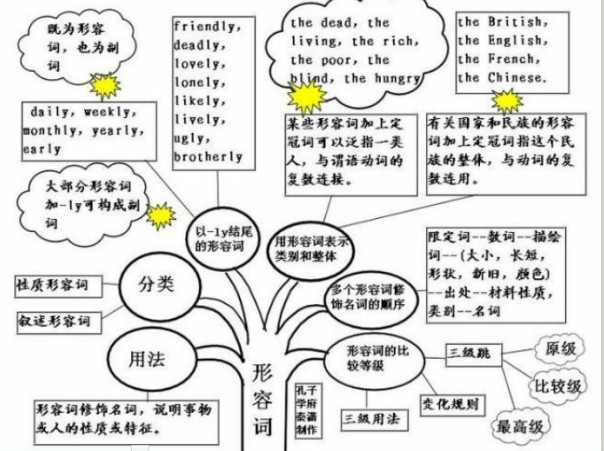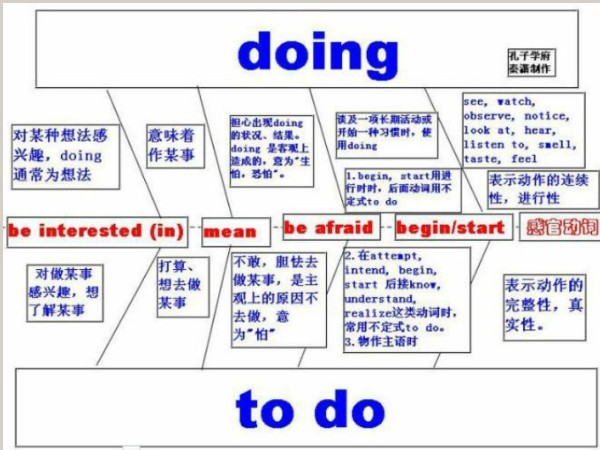本试题 “选词填空。根据所给句子选用方框内的词语填空(有多余选项),注意用其适当的形式。appeal to, as a whole, reach out for, watch out for, therefore, confuse...” 主要考查您对形容词
介词和介词短语
动名词
一般过去时
等考点的理解。关于这些考点您可以点击下面的选项卡查看详细档案。
- 形容词
- 介词和介词短语
- 动名词
- 一般过去时
形容词的概念:
形容词(adjective),简称adj.或a,形容词用来修饰名词或代词,表示人或事物的性质、状态,和特征的程度好坏与否,形容词在句中作定语、表语、宾语补足语。通常,可将形容词分成性质形容词和叙述形容词两类,其位置不一定都放在名词前面。
形容词的作用与位置:
形容词是用来修饰名词的,常被放在名词前作定语,或放在系动词后面作表语。以下属几种特殊情况,须牢记;
(1)形容词短语作定语,定语后置。
如:a language difficult to master,
a leaning tower about 180 feet high
(2)表语形容词(afraid、alike、alone、asleep、awake、alive等)作定语,定语后置。如a man alive。有些表身体健康状况的形容词如well、faint、ill只作表语。sick既可作表语又可作定语,ill如作定语意为“bad”。
(3)用作定语,修饰由不定代词one、no、any、some和every构成的复合词如anything、something等时,通常后置。
如:I have something important to tell you.
(4)else常用作疑问代词和不定代词的后置定语。
(5)enough、nearby修饰名词前置或后置,程度副词一般位于形容词、副词前面,enough修饰形容词、副词时,必须后置。
(6)几个并列的形容词作定语,其语序通常为:限定语(The、A)+描绘性形容词+size(大小)+shape(形状)+age(年龄、时间)+color(颜色)+origin(国籍、来源)+material(材料)+purpose(目的)+名词。
口诀:
限定描绘大长高,形状年龄和新老;颜色国籍跟材料,作用类别往后靠。
如:a heavy black Chinese steel umbrella,
the man's first tow interesting little red French oil paintings
形容词的用法:
1、形容词修饰名词,说明事物或人的性质或特征。通常,可将形容词分成性质形容词和叙述形容词两类,其位置不一定都放在名词前面:
1)直接说明事物的性质或特征的形容词是性质形容词,它有级的变化,可以用程度副词修饰,在句中可作定语、表语和补语。例如:hot热的。
2)叙述形容词只能作表语,所以又称为表语形容词。这类形容词没有级的变化,也不可用程度副词修饰。
大多数以a开头的形容词都属于这一类。例如:
afraid害怕的。(错)Heisanillman. (对)Themanisill. (错)Sheisanafraidgirl. (对)Thegirlisafraid.
这类词还有:well,unwell,ill,faint,afraid,alike,alive,alone,asleep,awake等。
3)形容词作定语修饰名词时,要放在名词的前边。但是如果形容词修饰以-thing为字尾的词语时,要放在这些词之后。例如:somethingnice
2、用形容词表示类别和整体:
1)某些形容词加上定冠词可以泛指一类人,与谓语动词的复数连接。如:the dead,the living,the rich,the poor,the blind,the hungry The poorarelosinghope.穷人失去了希望。
2)有关国家和民族的形容词加上定冠词指这个民族的整体,与动词的复数连用。如:the British,the English,the French,the Chinese. The English have wonderful senseofhumor.
以-ly结尾的形容词:
1)大部分形容词加-ly可构成副词。但friendly,deadly,lovely,lonely,likely,lively,ugly,brotherly,仍为形容词。改错:
如:(错)She sang lovely.
(错)He spoke to me very friendly.
(对)Her singing was lovely.
(对)He spoke to me in a very friendly way.
2)有些以-ly结尾既为形容词,也为副词。 daily,weekly,monthly,yearly,early .
如:The Times is a daily paper.
The Times is published daily.
形容词知识体系:

复合形容词的构成:
(1)形容词+名词+ed:
如:kind-hearted 好心的,white-haired 白发的
(2)形容词+形容词:
如:red-hot 炽热的,dark-blue 深蓝的
(3)形容词+现在分词:
如:good-looking 好看的,easy-going 随和的
(4)副词+现在分词:
如:hard-working 勤劳的,fast-moving 快速转动的
(5)副词+过去分词:
如:hard-won 得来不易的,newly-made 新建的
(6)名词+形容词:
如:life-long 终生的,world-famous 世界闻名的
(7)名词+现在分词:
如:peace-loving 爱好和平的,fun-loving 爱开玩笑的
(8)名词+过去分词:
如:snow-covered 白雪覆盖的,hand-made 手工的
(9)数词+名词+ed:
如:four-storeyed 4层楼的,three-legged 3条腿的
(10)数词+名词(名词用单数):
如:ten-year 10年的, two-man 两人的
介词和介词短语的概念:
介词是一种用来表示词与词、词与句之间的关系的虚词,在句中不能单独作句子成分。介词后面一般有名词、代词或相当于名词的其他词类,短语或从句作它的宾语。介词和它的宾语构成介词词组,在句中作状语,表语,补语或介词宾语。介词可以分为时间介词、地点介词、方式介词和其他介词。
误用介词的三种情况:
1、多用介词:
多用介词可能是受汉语意思的影响将及物动词误用作不及物动词,也可能是受相关结构的影响而用错:
误:We discussed about the plan.
正:We discussed the plan. 我们讨论了计划。
误:Did he mention about the accident?
正:Did he mention the accident? 他提到那次事故了吗?
误:I saw her enter into the bank.
正:I saw her enter the bank. 我看见她进了银行。
误:He married with[to] a nurse.
正:He married a nurse. 他同一位护士结了婚。
误:How can contact with you?
正:How can contact you? 我怎么与你联系?
误:We should serve for the people heart and soul.
正:We should serve the people heart and soul. 我们应该全心全意地为人民服务。
误:Who controls over the factory? (但名词control可接over)
正:Who controls the factory? 谁管理这个工厂?
误:He has a great many of friends here. (比较a great number of)
正:He has a great many friends here. 他在这儿有很多朋友。
2、漏用介词:
漏用介词可能是受汉语意思的影响将不及物动词误用作及物动词,或是受相关结构的影响的影响而用错等:
误:This matter is difficult to deal. (deal with=处理)
正:This matter is difficult to deal with. 这事很难处理。
误:He is not a man to be depended.
正:He is not a man to be depended on. 他不是个可靠的人。
误:He took a cup of tea, and went on the story.
正:He took a cup of tea, and wentonwiththestory.他喝了一口茶,又接着讲故事。
误:My mother still regards me a child. (比较consider…as中的as可省略)
正:My mother still regards me as a child. 我母亲还把我当小孩看。
误:They insisted sending a car over to fetch us.
正:They insisted on sending a car over to fetch us.他们坚持要派车来接我们。
误:What he says is worth listening.
正:What he said is worth listening to.他的话值得一听。
3、错用介词:
错用介词的情况比较复杂,可能是因受汉语意思的而错,也可能是因弄不清搭配关系而错,可能是混淆用法而错,也可能是受相关结构的影响而错,可能是忽略语境而错,也可能是想当然的用错:
误:She called on his office yesterday. (call on+人,call at+地点)
正:She called at his office yesterday. 她昨天去了他办公室拜访。
误:He is engaged with a nurse.
正:He is engaged to a nurse.他与一位护士订了婚。
误:The sun rises from the east.
正:The sun rises in the east.太阳从东方升起。
误:Under his help, I finished it in time.
正:With his help, I finished it in time. 在他的帮助下,我及时做完了。
误:During he was in Japan, he visited many places.
正:During his stay in Japan, he visited many places.他在日本期间,参观过许多地方。
误:We are familiar to his character.
正:We are familiar with his character.我们了解他的性格。
误:Help yourself with the fruit.
正:Help yourself to the fruit.吃点水果吧。
介词的宾语:
1、名词或代词作介词宾语:
如:Are you interested in history? 你对历史感兴趣吗?
Don't worry about it. 别为它担心。
注:若是人称代词用作介词宾语,要注意用宾格。
如:No one can sing like her. 没有人能像她那样唱歌。(不能用like she)
2、动名词作介词宾语:
如:He is good at telling stories. 他善于讲故事。
In crossing the street he was run over. 他在穿过马路时被汽车撞倒。
3、过去分词作介词宾语:
如:We can't regard the matter as settled. 我们不能认为这事已经解决。
I take it for granted you have read the book. 我以为你读过这本书。
注:过去分词用作介词宾语通常只见于某些固定结构中,如上面第1句涉及regard…as(认为…是)结构,第2句涉及take sth for granted(认为某事属实)。在其他情况下,介词后通常不直接跟过去分词作宾语,若语义上需要接过去分词(表被动),可换用“being+过去分词”:
如:He went out without being seen by the others.他出去了,没有被其他人看见。
4、从句作介词宾语:
如:He was not satisfied with what she said. 他对她说的不满意。
I'm worried about where he is. 我担心他上哪儿去了。
注:介词后通常不接that从句,遇此情况需考虑用其他结构:
误:He paid no attention to that she was poor.
正:He paid no attention to the fact that she was poor. 他根本不注意她很穷这一事实。
但有个别介词(如except)可接that从句。
比较:I know nothing about him except that he lives next door./I know nothing about him except for the fact that he lives next door. 我只知道他住在隔壁,其它的就不知道了。
5、不定式作介词宾语:
如:I had no choice but to wait. 除了等,我没有别的选择。
He wanted nothing but to stay there. 他只想留在那儿。
They did nothing but complain. 他们老是一个劲地抱怨。
He never did anything but watch TV. 除了看电视,他从不干任何事。
注:(1)介词后接不定式的情形通常只见于but, except等极个别个词。该不定式有时带to,有时不带to,其区别是:若其前出现了动词do,其后的不定式通常不带to;
若其前没有出现动词do,则其后的不定式通常带to。
(2)介词后虽然通常不直接跟不定式作宾语,但却可接“连接代词(副词)+不定式”结构:
如:He gave me some advice on how to do it. 对于如何做这事他给我提了些建议。
6、形容词作介词宾语:
如:Her pronunciation is far from perfect. 她的语音远不是完美的。
In short, we must be prepared. 总而言之,我们要有准备。
Things have gone from bad to worse. 事情越来越糟。
注:(1)有些形容词用作介词宾语可视为其前省略了动名词being:
如:He regarded the situationas(being) serious. 他认为形势严重。
His work is far from(being) satisfactory. 他的工作丝毫不令人满意。
(2)有些“介词+形容词”的结构已构成固定搭配:in full全部地,全面地,无省略地; in private私下地,秘密地; in particular特别地;in general一般地,通常地,概括地; in brief 简言之;in short总之,简言之; in vain徒然地,徒劳无益地;for fee免费地,无偿地; for certain肯定地,确切地;for sure肯定地,确切地; for short为了简短,简称;atl arge自由自在地,逍遥法外; by far…得多
7、副词作介词宾语:
如:I can't stay for long. 我不能久呆。
It's too hot in here. 这里面太热了。
I looked every where except there. 除了那儿,我到处都看过了。
8、数词作介词宾语:
如:The city has a population of four million. 这座城市有四百万人口。
He was among the first to arrive. 他是第一批到的。
9、介词短语作介词宾语:
如:Choose a book from among these. 从这些书中选一本吧。
I saw her from across the street. 我从街的对面望见了她。
注:通常可后接介词短语作宾语的介词是from, till, until, since, except, instead of等。
比较:I took it from the bed. 我从床那儿(或床上)拿的。
I took it from under the bed. 我从床下拿的。
10、复合结构用作介词宾语:
如:She had no objection to Mary marrying him. 她不反对玛丽与他结婚。
She came in with a book in her hand. 她手里拿着一本书走了进来。
All the afternoon he worked with the door locked. 整个下午他都锁着门在房里工作。
介词短语的句法功能:
1、表语:
如:He was with a friend. 他和一个朋友在一起。
Health is above wealth. 健康胜过财富。
This knife is for cutting bread. 这把小刀是用于切面包的。
注:有些介词(如because of)引出的短语通常只用作状语,不用作表语:
误:His absence is because of the rain.
正:His absence is due to the rain. 他因雨未来。
但是,若主语是代词(不是名词),becauseof引出的短语可用作表语:
如:It is because of hard work. 那是因为辛苦工作的原因。
2、状语:
如:Don't touch it with your hands. 别用手去摸它。
Did you do this by design or by accident? 你这样做是有意的还是无意的?
3、定语:
如:This is his reply to your letter. 这是他给你的回信。
This is the best way of doing it. 这是做此事最好的方法。
My love for you is deeper than the sea. 我对你的爱比海深。
4、宾语补足语:
如:I found everythingin good condition. 我发现一切正常。
Her illness kept her in bed for a week. 她因生病在床上躺了一星期。
注:用作宾语补足语的介词短语在相应的被动语态中则为主语补足语:
如:He was regarded as a hero. 他被看成是英雄。
5、宾语:
如:A man stepped out from behind the wall. 一个人从墙后走出来。
He cannot spare anytime except on Sunday. 除星期日外,他抽不出时间。
6、主语:
如:Between6 and 7 suits me. 六点到七点对我比较适合。
After the exams is the time to relax. 考试后是轻松一下的时间。
注:介词短语通常不用作主语,尽管有时也像上面这样用作主语,但通常可视为是在一定的上下文中有所省略:
如:—When are we going to have the next meeting? 我们下次什么时候见面?
—On Tuesday may be convenient. 星期二可能比较方便。
此句中onTuesday虽用作主语,但可视为是其前省略了meeting一词:
即:Meeting during the vacation may be convenient.
动名词概念:
动名词是一种兼有动词和名词特征的非限定动词。它可以支配宾语,也能被副词修饰,动名词有时态和语态的变化。
现在分词和动名词用法比较:
动词的-ing形式包括现在分词和动名词两种形式。他们的句法功能如下:
动词的-ing形式如果作句子的主语或者宾语时,应该是动名词形式;如果作补语或者状语时,应该是现在分词形式。那么作表语或者定语的动名词和现在分词又该怎样区分呢?
1、动名词与现在分词作表语时的比较:
(1)动名词作表语说明主语的内容,回答what的问题;现在分词作表语相当于形容词作表语,说明主语的性质、特征等,回答how的问题。
如:One of the best exercises is swimming. 游泳是最好的运动项目之一。
What pleases him most is bathing in the sea. 最使他高兴的事是在海中沐浴。
The situation both at home and abroad is very in-spiring. 国内外的形势都很鼓舞人心。
The color is pleasing to the eye. 颜色悦目。
(2)动名词作表语,表语和主语几乎处于同等地位,可以互换位置,其句意不变;现在分词作表语,表语和主语则不能互换位置。
如:Our work is serving the people.
(=Serving the people is our work.)我们的工作是为人民服务。
The news was disappointing. 那消息令人失望。
(3)作表语的现在分词前可以用very,quite,rather,greatly等副词修饰,而动名词则不可以。
如:What he said was very encouraging. 他的话很鼓舞人心。
Our goal is realizing the four modernizations in the near future. 我们的目标是在不久的将来实现四个现代化。
(4)现在分词与形容词一样可以和more,the most构成形容词的比较级和最高级,而动名词则不可以。
如:The story is the most fascinating. 那个故事最迷人。
(5)作表语用的现在分词除了和be连用以外,还可以和其它的系动词连用;而作表语的动名词则通常只能和be连用。
如:His speech seems inspiring.他的演讲似乎很鼓舞人心。
His interest is writing for the news papers. 他的爱好是给报社写文章。
(6)有些用作表语的现在分词已经形容词化了。常见的有:exciting,moving,inspiring,missing,interesting,disappointing等。
2、动名词与现在分词作定语时的比较:
(1)动名词作定语时,表示它所修饰的名词的性能和用途,和它所修饰的名词在逻辑上没有主谓关系;
现在分词作定语时,表示它所修饰的名词正在进行的动作,和它所修饰的名词在逻辑上有主谓关系,常可以扩展成一个定语从句。
如:a swimming girl=a girl who is swimming 一个在游泳的姑娘
a walking stick=a stick that is used for walking 一根拐杖
(2)现在分词作定语有时可以后置,而动名词则通常只能放在它所修饰的名词之前。
如:The girl wearing glasses is one of his students. 戴眼镜的那个女孩是他的一个学生。
I bought some reading materials. 我买了一些阅读材料。
动名词的用法:
1、作主语:
例如:Fighting broke out between the South and the North. 南方与北方开战了。
2、作宾语:
a. 有些动词可以用动名词作宾语。
例如:admit承认 appreciate感激 avoid避免 complete完成 consider认为 delay耽误 deny否认 detest讨厌 endure忍受 enjoy喜欢 escape逃脱 fancy想象 finish完成 imagine想象 mind介意 miss想念 postpone推迟 practice训练 recall回忆 resent讨厌 resume继续 resist抵抗 risk冒险 suggest建议 face面对 include包括 stand忍受 understand理解 forgive宽恕 keep继续
例如:Would you mind turning down your radio a little, please? 你把收音机音量调小一点,好吗?
The squirrel was lucky that it just missed being caught. 这松鼠幸运得很,刚逃避了被逮住的厄运。
b. 有些结构后面可以用动名词作宾语或其他成分。
例如:admit to prefer...to burst out keep on insist on count on set about put off be good at take up give up be successful in be used to lead to devote oneself to object to stick to no good no use be fond of look forward to be proud of be busy can't help be tired of be capable of be afraid of think of
3、作表语,对主语说明、解释:
例如:Her job is washing, cleaning and taking care of the children. 她的工作是洗刷、清扫和照顾孩子。
比较:She is washing, cleaning and taking care of the children.
4、作定语,一般表示所修饰名词事物的用途:
例如:a writing desk=a desk for writing 写字台
a swimming pool=a pool swimming 游泳池
有些动名词作定语,与所修饰的名词关系比较复杂。
例如:boiling point=a temperature point at which something begins to boil 沸点
a walking tractor=a tractor which a driver can operate while he or she is walking behind it 手扶拖拉机
动名词知识体系:

动名词与不定式用法对比:

一般过去时的概念:
一般过去时表示过去某个时间里发生的动作或状态;过去习惯性、经常性的动作、行为;过去主语所具备的能力和性格。
一般过去时的用法:
1、表示过去发生的动作或存在的状态,常与表示过去时间的副词如:yesterday,last week,two hours ago等连用。
如:My family moved here five years ago. 我家五年前搬到了这里。
I was born in 1973. 我生于1973年。
2、表示过去一段时间经常或反复发生的动作。这时可与频度副词如:often,usually,always等连用。
如:He always worked in tonight those days. 那些日子他总是工作到深夜。
I often left on business in 1987. 1987年我经常出差。
注:表示“过去经常,而今不再”时,要用usedto.
如:I used to read newspaper after breakfast. 我过去经常早饭后看报纸。(意指现在已不是这样)
The children often swam in this river. 孩子们过去经常在这条河里游泳。
3、表示过去发生的一连串动作。
如:He put down the heavy box, took out the keys, and opened the door. 他放下这沉重的箱子,掏出钥匙开了房门。
注:过去发生的一连串动作,若用and,or,but等并列连词连接,则一律用过去式。
如:They moved the chairs to the table, sat down and began to have supper. 他们把椅子搬到桌边,坐下开始吃饭。
4、在时间和条件状语从句中,用一般过去时表示过去将来的动作。
如:He said that he would let me know as soon as he got the information. 他说他一得到消息就立即让我知道。
Mary told me that she would stay at home if it rained. 玛丽告诉我如果下雨她就呆在家里。
一般过去时的特别用法:
1、句型:It is time for sb. to do sth "到……时间了" "该……了"。
例如:It is time for you to go to bed.你该睡觉了。
It is time that sb.did sth. "时间已迟了" "早该……了"。
例如:It is time you went to bed. 你早该睡觉了。
2、would(had)rather sb.did sth. 表示'宁愿某人做某事'。
例如:I'd rather you came tomorrow. 还是明天来吧。
3、wish, wonder, think, hope等用过去时,作试探性的询问、请求、建议等,而一般过去时表示的动作或状态都已成为过去,现已不复存在。
例如:I thought you might have some. 我以为你想要一些。
比较:Christine was an invalid all her life.(含义:她已不在人间。)
Christine has been an invalid all her life.(含义:她现在还活着)
Mrs. Darby lived in Kentucky for seven years.(含义:达比太太已不再住在肯塔基州。)
Mrs. Darby has lived in Kentucky for seven years.(含义:现在还住在肯塔基州,有可能指刚离去)
注意:用过去时表示现在,表示委婉语气。
1)动词want, hope, wonder, think, intend等。
例如:Did you want any thing else? 您还要些什么吗?
I wondered if you could help me. 能不能帮我一下。
2)情态动词could, would。
例如:Could you lend me your bike? 你的自行车,能借用一些吗?
与“选词填空。根据所给句子选用方框内的词语填空(有多余选项),...”考查相似的试题有:
- I’m not a little tired today after giving the room a thorough cleaning and I have never had ____ today.A.as tiring a...
- He told me that in the following days there were other changes, even more _________.A.abruptB.changeableC.suitable...
- —— We should adopt _________ methods to deal with some incidents. You know, anything could occur in that situation.——...
- John spent most of his time practising speaking English in addition _____ his spare time.[ ]A. ofB. toC. forD. into
- It is said that a ship struck some rocks ________ the east coast and sank.[ ]A. offB. onC. inD. to
- Michael Jackson’s personal doctor may admit the accusation if he can’t find any convincing evidence ______.[ ]A.to t...
- Having walked for long, he decided to lean the big tree for a short break.[ ]A. againstB. onC. underD. beyond
- --Is Bob still performing ?--I’m afraid not . He is said the stage already as he has become an official.A.to have le...
- No one could _________ the failure of the experiment as everything went smoothly at first.A.give an account forB.ac...
- Many people in China have never dreamed of ____ achance for them to learn to driveafter their retirement.[ ]A. beingB...